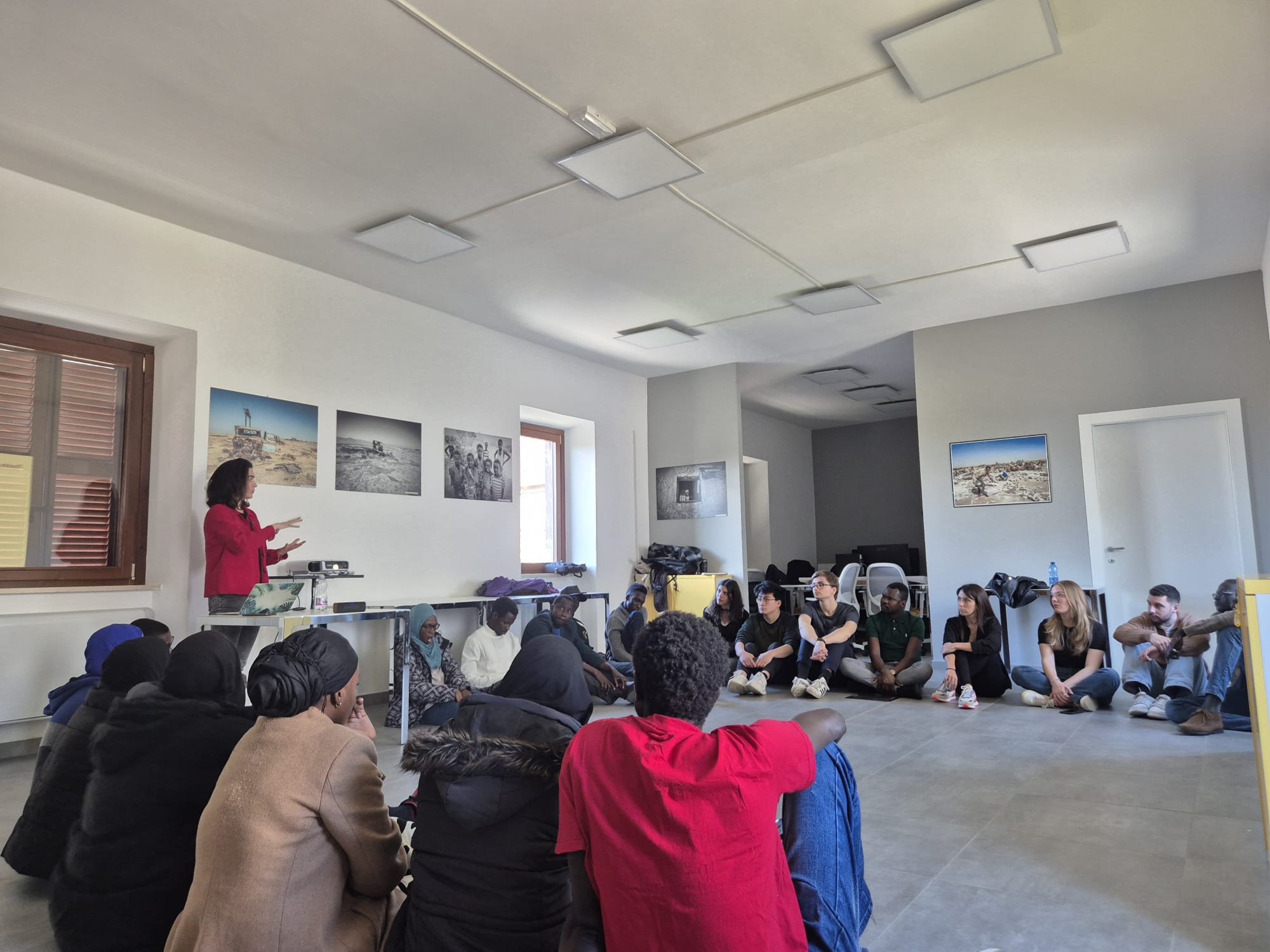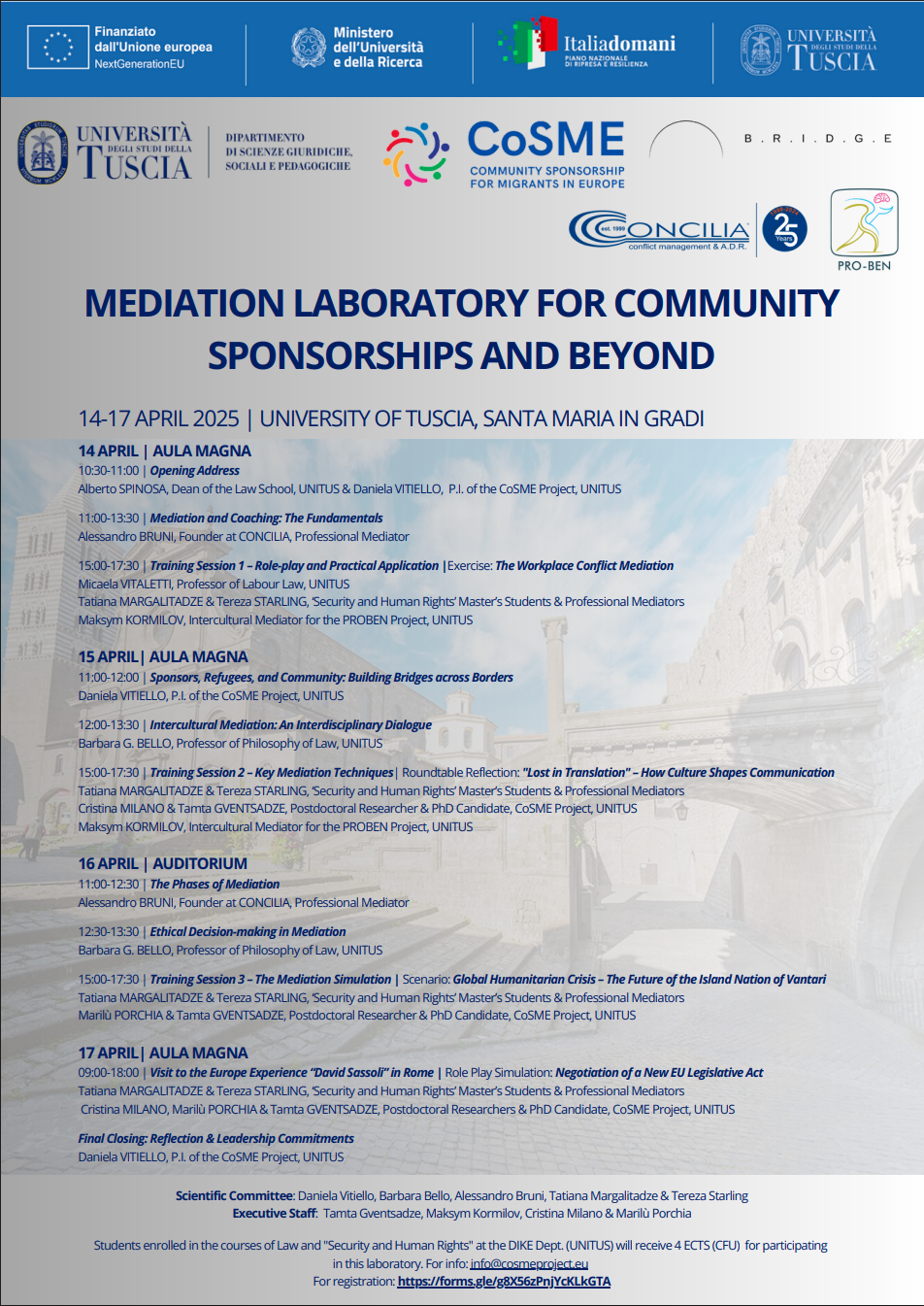![]()
L’Università degli Studi della Tuscia sul podio della 8ª edizione della Italian Negotiation Competition – 16 e 17 maggio 2025
L’8ª edizione della Italian Negotiation
Il team UNITUS, composto da due studentesse del corso di laurea magistrale internazionale in “Security and Human Rights” – Tatiana Margalitadze e Tereza Starling – da due docenti del corso di laurea unificato di Giurisprudenza e Studi europei del DIKE – Gina Gioia e Daniela Vitiello – e da Alessandro Bruni (fondatore e partner di CONCILIA), è arrivato sul podio, qualificandosi per la medaglia di bronzo.
Un risultato che arriva alla prima esperienza di costituzione di un team UNITUS per questa competizione e che crea le basi per un crescente impegno in preparazione della International Negotiation
La partecipazione alla Italian Negotiation
Il laboratorio di mediazione è stato promosso dal PRIN CoSME del Dipartimento DIKE, in collaborazione con l’iniziativa studentesca “B.R.I.D.G.E”, la società CONCILIA e il progetto di Ateneo PRO-BEN. Grazie a tutto il team: Barbara Giovanna Bello, Alessandro Bruni, Micaela Vitaletti, Tereza Starling, Tatiana Margalitadze, Tamta Gventsadze, Maksym Kormilov, Cristina Milano & Marilù Porchia.
(https://www.unitus.it/magazine/news/8a-edizione-della-italian-negotiation-competition-16-e-17-maggio-2025/)
Mediation Laboratory for Community Sponsorships and Beyond
University of Tuscia, 14–17 April 2025
From 14 to 17 April 2025, the CoSME Project hosted the MED LAB at the University of Tuscia, in collaboration with the B.R.I.D.G.E., CONCILIA and PROBEN – a team of mediators and trainers who contributed both to the organization and facilitation of the lab’s core activities.
The laboratory, based on the thematic focus of the role of the communities in fostering processes of refugee integration and inclusion, welcomed a diverse group of participants – from university students to early-career professionals – offering a space to explore mediation, intercultural dialogue, and conflict resolution through applied learning and peer-led simulations.
14 APRIL | Day 1 – Foundations of Mediation
Following the opening remarks by the Principal Investigator of the CoSME Project, Daniela Vitiello, the first morning of the MED LAB continued with a session led by Alessandro Bruni, lawyer and international mediator, founder and partner at CONCILIA, who introduced participants to the fundamental principles of mediation. He reflected on what it means to take on the role of a mediator and drew thoughtful comparisons between mediation and coaching—highlighting how each approach fosters dialogue, but through different methods and mindsets.
After that, Micaela Vitaletti, professor of Labour Law at the DIKE Department, UNITUS, offered a thought-provoking introduction on the role of mediation in workplace transaction and legal settings.
In the afternoon, the group moved into a practical training session on workplace conflict mediation, facilitated by Tatiana Margalitadze and Tereza Starling, founders of the B.R.I.D.G.E. mediators and students of the Master’s Degree Programme in European Studies “Security and Human Rights” at the DIKE Department, UNITUS, and with the support from Tamta Gventsadze, PhD student in the PhD Programme in Law of Global Markets, and member of the CoSME Project team, DIKE Department, UNITUS. Before the training, the B.R.I.D.G.E team introduced to the participants the key mediation principles and techniques that they could apply during the practice. They then explored a realistic workplace scenario through guided role-play, developing a deeper awareness of how communication styles, emotional dynamics, and underlying values shape the resolution process. The session allowed space for self-reflection, peer feedback, and experimentation with different ways of engaging in dialogue and building understanding in conflict situations.
15 APRIL | Day 2 – Culture, Dialogue & Intercultural Mediation
The day began with a powerful session led by Daniela Vitiello, focusing on “Sponsors, Refugees, and Community: Building Bridges across Borders”. Drawing on the expertise gained through the CoSME Project, the Principal Investigator invited participants to reflect on the role of mediation in supporting active reception and integration policies for migrants and refugees, concentrating on the potential of dignified paths based on win-win strategies of mutual understanding in the context of community sponsorship. Her presentation was enriched by practical insights from Maksym Kormilov, cultural mediator in the PRO-BEN Project, UNITUS, who shared experiences from working directly with refugee communities and at the border.
This was followed by the presentation of Barbara Bello, professor of Philosophy of Law at DIKE Department, UNITUS, on “Intercultural Mediation: An Interdisciplinary Dialogue”. Barbara examined how culture shapes communication and multiple belongings in the migratory context can affect the construction of resilient communities. The session included the storytelling-based simulation “Abigail’s Tale”, prompting participants to reflect on values, roles, and emotional dynamics in conflict situations involving multicultural and migratory backgrounds.
The day then transitioned into a hands-on afternoon training session led by Tereza Starling and Tatiana Margalitadze, with the participation of Maksym Kormilov and the contribution from Cristina Milano, PhD student in the PhD Programme in Law of Global Markets, and member of the CoSME Project team, DIKE Department, UNITUS. Participants were invited to examine intercultural misunderstandings in everyday life, including situations such as visiting a doctor or navigating casual social interactions. Through role-play and group discussion, they explored how cultural assumptions affect communication and how awareness and empathy can help bridge those divides in meaningful, practical ways.
16 APRIL | Day 3 – Ethics, Mediation Process & Crisis Simulation
The third day of the MED LAB began with a focused session on the phases of mediation, led by Alessandro Bruni. The discussion followed the full trajectory of a mediation – from initial contact to agreement-building – highlighting key elements such as neutrality, emotional intelligence, and strategic timing. The session was enriched by a video demonstration of a real-life mediation, offering participants a glimpse into the practical realities of the profession.
This was followed by an interactive session on ethical decision-making, led by Barbara Bello. Designed as a space for brainstorming, dialogue, and shared reflection, the session prompted participants to exchange views on complex ethical dilemmas, consider the impact of context and power, and reflect on how mediators can maintain integrity while navigating conflicting expectations.
In the afternoon, the group participated in a crisis mediation simulation titled “Global Humanitarian Crisis – The Future of the Island Nation of Vantari”. Facilitated by the B.R.I.D.G.E. team – Tatiana Margalitadze and Tereza Starling, with support from Marilù Porchia, postdoctoral researcher and member of the CoSME Project team, DIKE Department, UNITUS, and Tamta Gventsadze, the simulation placed students in the roles of various stakeholders negotiating the future of a nation affected by environmental collapse and displacement. The session challenged participants to manage high-stakes dialogue, balance competing interests, and respond to complex emotional dynamics – mirroring real-world humanitarian negotiations while applying the tools and techniques developed throughout the lab.
This session provided useful insight also on the role of the host communities in streamlining processes of effective reception and inclusion of refugees in situations of mass displacement, one of the key focuses of the CoSME Project.
It was incredible to watch students so deeply engaged in tackling such a layered and sensitive problem, drawing on everything they had learned while stepping into roles that required leadership, empathy, and creativity.
The session closed with an important reflection:
Perhaps, if any of us are ever in a position to make decisions that will affect millions, we might remember that real leadership lies not in winning, gaining power, or profit – but in focusing on what political and legal solutions truly serve people.
17 APRIL | Day 4 – From Dialogue to Policy: A European Finale in Rome
The final day of the MED LAB brought a memorable close to the week. Held at the Europe Experience “David Sassoli” in Rome, it marked a powerful transition from learning to real-world application.
An interactive quiz on EU history set the tone, sparking energy and curiosity as participants explored the evolution of European institutions and values.
The main activity was a legislative simulation, where participants took on the roles of EU representatives negotiating a new policy proposal. Drawing on the skills acquired during the training sessions—including dialogue techniques, cultural awareness, and negotiation strategies—they worked collaboratively to build consensus and navigate differing interests.
What stood out was how naturally they embraced the challenge. Their engagement was thoughtful, strategic, and focused on cooperation. It was clear they weren’t just simulating—they were applying what they had learned with confidence and purpose.
This final day ended with the distribution of the certificates of attendance to all the participants by the CoSME P.I and the B.R.I.D.G.E. team, assisted by Cristina Milano and Marilù Porchia. This final day didn’t just conclude the MED LAB – it brought it full circle, showing how the principles of mediation and dialogue can move from the classroom into the heart of public life.
Closing Reflections
MED LAB 2025 came to a close with a strong sense of connection, purpose, and shared growth. What began as a training quickly turned into something more: a space where ideas were tested, perspectives exchanged, and futures imagined.
Throughout the week, participants navigated complex simulations, debated ethical choices, and engaged in rich discussions across disciplines and cultures. It was a learning experience shaped not just by content, but by collaboration—and by the willingness of everyone involved to dive in with curiosity and courage.
A heartfelt thank you to everyone who made this experience possible, especially the team behind the scenes and on the ground:
Scientific Committee
- Daniela Vitiello, coordinator of the Master’s Degree Programme in European Studies “Security and Human Rights” (SHR), principal investigator of the CoSME Project, DIKE Department, UNITUS
- Barbara G. Bello, professor of Philosophy of Law, DIKE Department, UNITUS
- Alessandro Bruni, lawyer and international professional mediator, founder & partner at CONCILIA
- Tatiana Margalitadze & Tereza Starling: young mediators, founders & partners at R.I.D.G.E., master’s degree students at SHR
Executive Staff & Facilitators
- Tamta Gventsadze, PhD student in the PhD Programme in Law of Global Markets, and member of the CoSME Project team, DIKE Department, UNITUS
- Maksym Kormilov, expert in migrant and refugee integration, linguistic and cultural mediator in the PRO-BEN Project, UNITUS
- Cristina Milano, PhD student in the PhD Programme in Law of Global Markets, and member of the CoSME Project team, DIKE Department, UNITUS
- Marilù Porchia, postdoctoral researcher and member of the CoSME Project team, DIKE Department, UNITUS
And to all the students and participants whose energy, openness, and engagement brought the lab to life – THANK YOU. Your commitment to dialogue and collaboration made every moment count.


